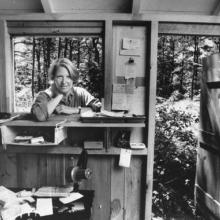mary oliver
LAST WINTER I woke up to 24 text messages on the family chain, which could only mean that someone had died, or someone was pregnant, or the San Antonio Spurs had finally decided to end their rebuild and trade four first-round draft picks for star point guard Trae Young. But I was wrong. My 2-year-old nephew Sébastien had asked his first theological question. The question arrived, according to my sister, around 6 a.m., an ungodly time for existential matters.
“What is a soul, mama?” Séb asked her. My nephew had been running through the lyrics of “Frosty the Snowman,” wondering what it meant to have a “jolly, happy soul.”
I FaceTimed my sister to learn more. “How did you respond?” I don’t have any kids — yet — so her anecdote was equal parts thrilling and terrifying.
THERE'S NEVER A bad time to show a woman you value that she’s a woman of valor. But there are bad gifts. Just because your favorite Jesus feminist loves Mary Oliver, for instance, doesn’t mean you should gift her a wild goose — no matter how harsh and exciting the goose may be. Also, do not arrange a telegram delivered to her by a man dressed in a gazelle outfit reading the Song of Songs; her parents might be over for Sunday dinner! And I can’t emphasize this enough: Do not gift her an animatronic infant in a basket floating down a river. I learned that one the hard way.
But don’t worry, there are plenty of other options:
IN HER POEM “Flare,” Mary Oliver writes about grief and the relationship between memory and reality, especially when it comes to parents. She writes: “My mother / was the blue wisteria, / my mother / was the mossy stream out behind the house, / my mother, alas, alas, / did not always love her life, / heavier than iron it was / as she carried it in her arms, from room to room.”
Our relationships with parents are shaped by our memories, what parents tell us about their lives, and what we come to understand about them. The Bible tells us to honor our father and mother, but we can never do that perfectly because we never fully know them. This becomes more poignant when those who raised us are no longer around.
Like Oliver’s poem, Joanna Hogg’s The Eternal Daughter (available on video on demand) captures this liminal, lonely feeling in an intensely personal way. Hogg’s semi-autobiographical film is a ghost story about memory, family, and the pull between the stories we know, the ones we don’t, and unresolved ways they differ.
Being unafraid of death is easier said than done. Death is one of the great fears that stalks the minds and hearts of human beings. That being said, there are times when Paul still dares to mock death: “‘Where, O death, is your victory? Where, O death, is your sting?’” (1 Corinthians 15:55). As a pastor, I have held plenty of hands as people die, yet I have never heard such boasting. What I have heard are regrets, contentment, fear, and any number of emotions. How we face death is complicated.
WITH THIS MONTH'S liturgical arc, we move from Epiphany to Lent: from a season of illumination to one of penitence. You’d think they would be reversed, though. You’d think it would be necessary to do the soul-searching first, to clean house before we get to invite God over for tea.
But the natural order of things always becomes topsy-turvy when God gets involved. God’s time “doubles back and loops around and ends up looking something like ... the name ‘Jeremy Bearimy’ in cursive English,” as Michael (Ted Danson) explains to Eleanor (Kristen Bell) in television’s The Good Place. The dot over Bearimy’s “i” represents Tuesdays, July, and “when nothing never occurs.”
Joking aside, this is the gift of the liturgical calendar: It lets us glimpse what it’s like to live in God’s time rather than our own. We don’t need to be worthy of an encounter with God before that encounter can happen because we constantly live in the kingdom space of already-not-yet. Revelation and repentance are like the proverbial chicken and egg: No one really knows which comes first, and it probably doesn’t matter in the end.
Divine time’s topsy-turvy nature is also why Christians are called to discern the difference between the “wisdom of this age” and God’s wisdom (1 Corinthians 2:6-7). What this month’s readings might call us to ponder, then, is not where human and Divine wisdoms diverge but, rather, where on Jeremy Bearimy’s curves they converge. Perhaps even on the dot of the “i.”
Mary Oliver often explored big existential questions with the unlikeliest of philosophical partners: moss, roses, geese, dogs, waves. They all had interesting things to say to her. In a 2015 interview with Krista Tippett, Oliver explained that there is nothing more interesting to her than spirituality. “So I cling to it,” she said. “I have no answers, but have some suggestions.” Her poems are riddled with those suggestions. Here are some of my favorites
In the metaverse, you don’t just curate your surroundings — you also curate your own avatar. One of Zuckerberg’s poker pals, for instance, arrived at the virtual party as a robot wearing a baseball cap.
Gratitude is far more radical than slapping a #blessed hashtag on a social media post. When we give thanks, we are invited to build a beloved community that aligns with our enduring moral values of justice, peace, and love for our neighbors.
I HAD GEARED myself up for a sort of Job-God exchange between Mary Oliver and some wild roses in the aptly named “Roses,” from her latest collection of poems, Felicity.
This is the scene: The narrator, full of poetic angst and existential fatalism, approaches some huddled roses and wonders in their direction: “What happens when the curtain goes / down and nothing stops it, not kissing, / not going to the mall, not the Super Bowl.”
I was ready for the roses to respond in a whirlwind full of rhetorical questions about the wonder and origin of creation. Instead they deflect the inquiry: “‘But as you can see, we are / just now entirely busy being roses.’”
And I laughed. In the past, Oliver’s poetry has caused me to cry over a dog (see “The First Time Percy Came Back”) and pray accidentally (see “The Summer Day”), but never before had her poems made me laugh.
In her 2014 collection Blue Horses, the flowers are “fragile blue.” They are “wrinkled and fading in the grass” until the next morning when somehow they crawl back up to the shrubs, bloom a bit, decide they want—just like all of us—“a little more of / life.” Now, in her latest collection of poetry, Oliver’s flowers are red, and they want as much life as they can get. They are carefree roses with a love of causal banter and a kind distaste for troubling existential questions.
What’s the first thing you think of when you think poetry readings by a Poet Laureate and a Pullitzer Prize winner? Well, whatever it is, I’m sure you weren’t thinking dogs.
Nonetheless, pet dogs were brought up more than anything else during poetry readings by Billy Collins and Mary Oliver at the Strathmore in Bethesda, Md. on Sunday. They managed to bring up their dogs in a beautifully poetic way, of course.
But perhaps the most important take away from the evening came from Oliver during a question and answer time after the readings. She said something like this: “Pay attention. Be astonished. And tell about it. We’re soaked in distractions. The world didn’t have to be beautiful. We can and should think about that beauty and be grateful.”
Those are words I have tried to live by for the last year.
Both poets demonstrated that attention in their work — even in poems about dogs.
When Sojourners CEO Jim Wallis departed on his three-month sabbatical at the beginning of January, I sent him a list of books, films and music that I thought would nourish his mind and spirit in, perhaps, different ways than the media he normally consumes do.
Jim's sabbatical — a true Sabbath in the literal sense — is designed to be a time of rest and, more importantly, rejuvenation. It will also be a creative time when he will be working on a new book.
Jim is a creative. A writer. A visionary. He regularly digs deep into his heart and soul, breaks himself open and pours out his passion, hope and faith for the edification of others. If creatives aren't diligent, though, we can work ourselves into the ground. Our wells can run dry.
In sending Jim this list of what I like to think of as "soul food," I hoped to inspire his imagination and give him new fuel for the fire, if you will.











